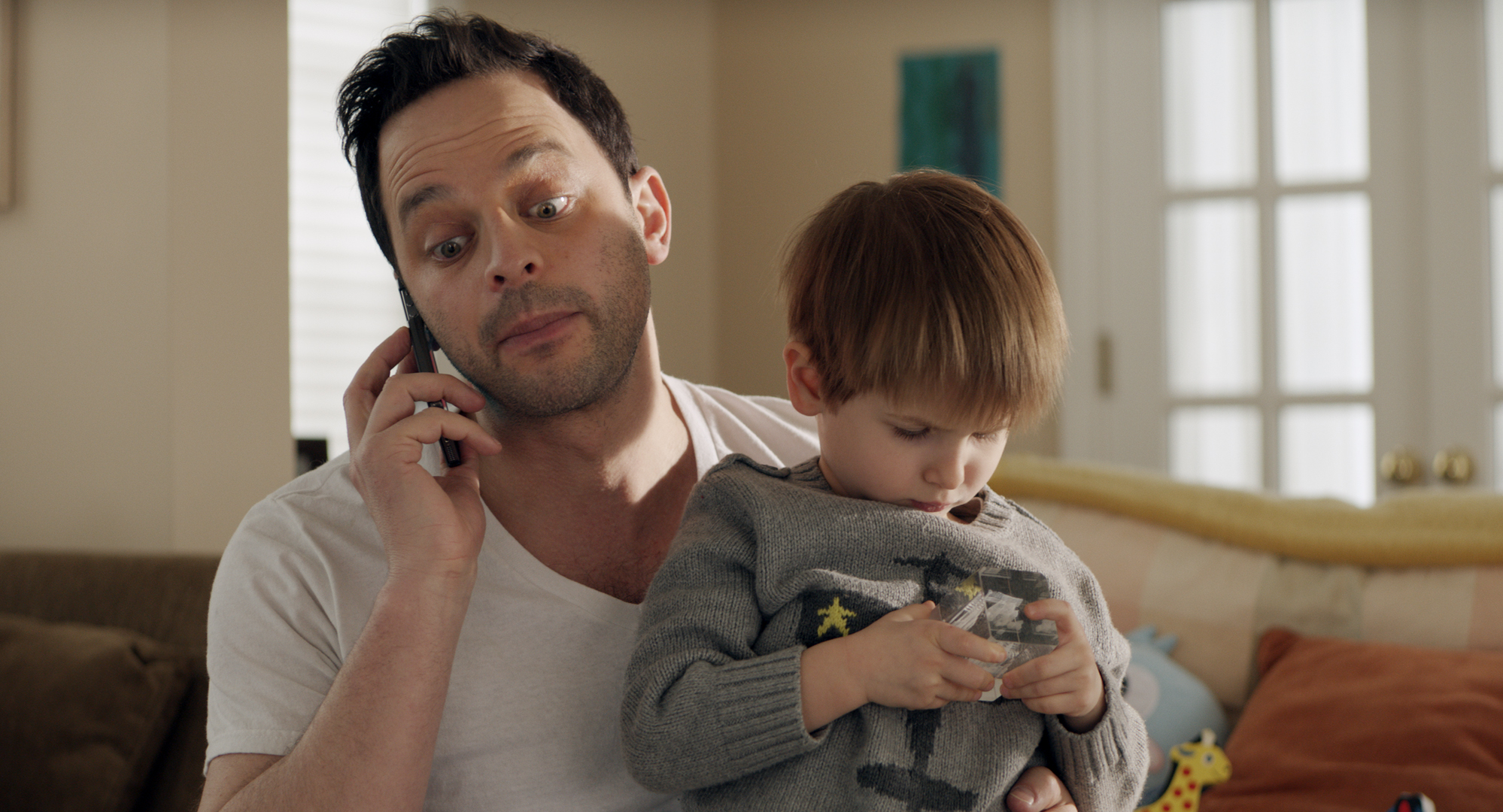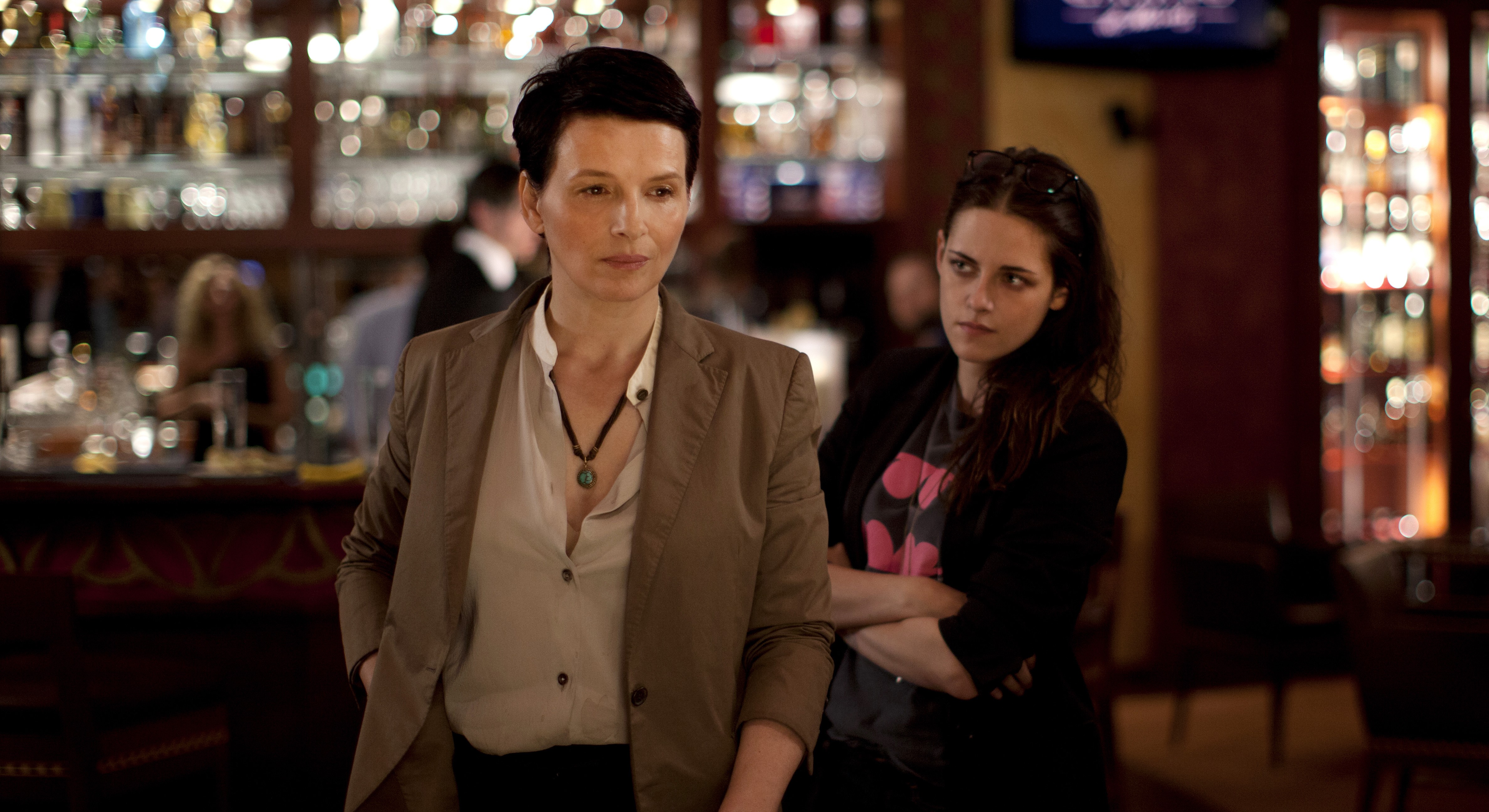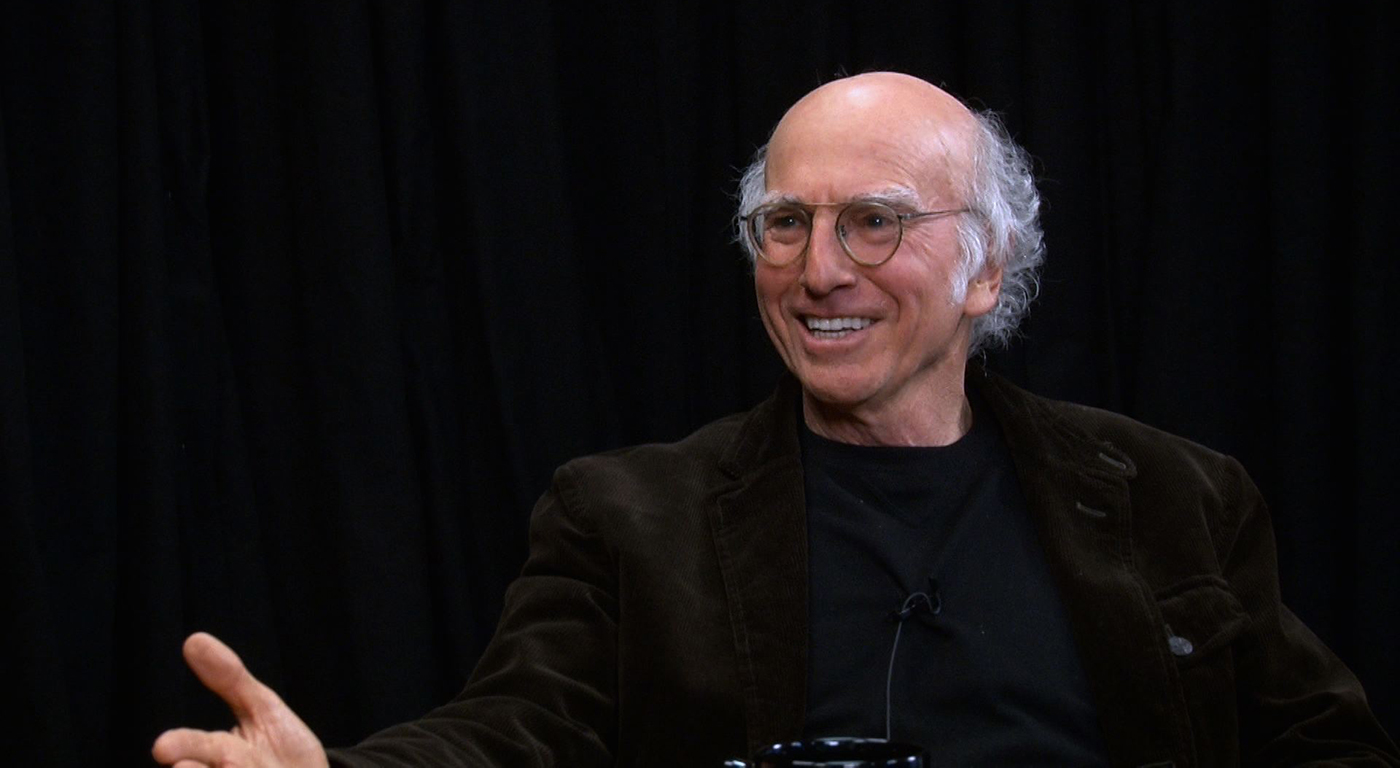Opening ThisWeek
Adult Beginners
Opens Fri., May 1 at SIFF Cinema Uptown & Varsity. Rated R. 90 minutes.
A popular basic-cable performer on The League and Kroll Show for the past half-dozen years, Nick Kroll can be forgiven for arriving a little late to the movies’ post-recession flop-com genre. His brash NYC tech maven Jake watches as a planned product launch goes down in flames, losing all his and his investors’ money, then retreats—a broken man, ashamed, tail between legs—to his childhood home in New Rochelle. Never mind that most millennials are now cycling in the other direction during our current tech boom; Adult Beginners lags behind the times in more ways than one. (Kroll supplied the premise for the movie, directed by Ross Katz, with screenplay by Jeff Cox and Liz Flahive.) The Skeleton Twins recently offered sibling melodrama in such a return-to-the-nest scenario (also sans parents), while This Is Where I Leave You put a more entertaining, multigenerational spin on the same material. (Happy Christmas, starring Anna Kendrick, at least made the prodigal fuck-up a woman.)
Kroll’s basic task here is fairly lazy and certainly unoriginal: Make Jake just enough of a selfish asshole to need redemption, then redeem by the proven means of cute children and family values. Does Jake truly need to change in this familiar story template, or show any final evidence of change? Not really. The script is contrived to add skimpy notions of growth to his character: reconciling with his married suburban sister (Rose Byrne, no damage to her career), forgiving his doofus brother-in-law (Bobby Cannavale, coasting more than he should), and bonding with their icky-sweet 3-year-old son (cue the poop jokes, please).
Even while Jake’s diaper-changing maturation is a given (he’s forced to “manny” in exchange for living with his sister’s family), Adult Beginners does at least strive for gender parity. Byrne’s Justine is a borderline-alcoholic Ivy Leaguer who dropped out of law school when pregnant, now married to a contractor with the disposition and smarts of a golden retriever. Her discontents are like those of Kristen Wiig’s character in Skeleton Twins, compounded by the child that keeps her trapped below potential. As Jake glides easily toward self-validation in this rote, predictable dramedy, it’s Justine’s fate than haunts you after the final hugs. Jake can move on, charming and childless, while she’s stuck in New Rochelle. If there are other options for such women, Adult Beginners ends without exploring them. Brian Miller
Avengers: Age of Ultron
Opens Fri., May 1 at Cinerama and other theaters. Rated PG-13. 141 minutes.
The characters in current superhero movies must’ve grown up reading comic books. In Marvel’s run of blockbusters, Iron Man and Thor and the gang (well, maybe not Captain America) are steeped in cultural references; they know all the cliches of pulp fiction, even as they embody them. Aware of the absurdity of wearing tights and wielding magical hammers, they make jovial banter about it when they’re not busy saving the world. This self-conscious tendency reached its peak in Guardians of the Galaxy, a stealth-bomber sendup of the superhero movie.
Avengers: Age of Ultron can’t top Guardians in that department. But writer/director Joss Whedon balances comedy and derring-do with dexterity, and this sequel to 2012’s top grosser doesn’t stall the franchise. Plus it’s got new characters to geek out about, villains especially. Ultron is an artificial-intelligence “murderbot” inadvertently created by billionaire Tony Stark (Robert Downey, Jr.)—also known as Iron Man, of course—and scientist Bruce Banner (Mark Ruffalo), aka the Hulk. Ultron changes robotic shape during the film, but his voice is provided by James Spader, who sounds like a tiger mellowed out on expensive brandy. He’s fun, if perhaps overly humorous for a creature who seeks to end mankind’s dominance on Earth. But Whedon, an encyclopedia of pop culture, can’t help himself—earnestness about this nonsense is for 20th-century suckers.
The Avengers must fight Ultron as well as newcomers Quicksilver (Aaron Taylor-Johnson) and Scarlet Witch (Elizabeth Olsen). Paul Bettany, previously the voice of Tony Stark’s computer, gets an expanded role here, and makes something haunting out of it. It’s a crowded field, although Whedon tries to find bits and bobs for everybody. Except Thor (Chris Hemsworth). Even Whedon can’t really make Thor very interesting. What gave The Avengers its kick was the recognizably human interplay between these titans, and on that score Ultron falls down a little: The rivalry between Stark and Steve Rogers (aka Captain America, played by Chris Evans) isn’t fresh; the heat between Banner and Natasha Romanoff (aka Black Widow, played by Scarlet Johansson) feels obligatory; and the backstory for Hawkeye (Jeremy Renner) is a standard attempt to provide “depth” for one-dimensional characters.
Still, it’s possible to approve of how such a billion-dollar apparatus can be this fast and breezy. And—as though Whedon absorbed some of the criticism of the first film’s endless climax, in which countless citizens must have perished while the superheroes cracked wise—the big finish here isn’t as bloated. Even Marvel skeptics have Ultron to enjoy. It’s not easy to out-irony Robert Downey, Jr., but Spader succeeds; Ultron wouldn’t be out of place as a campy Austin Powers villain. “I’m glad you asked that,” says Ultron in response to one of Stark’s questions. “Because I wanted to take this time to explain my evil plan.” He then destroys everything in sight. Robert Horton
PClouds of Sils Maria
Opens Fri., May 1 at Seven Gables. Rated R. 123 minutes.
Try to draw a straight line—I sure can’t—from Olivier Assayas’ sexy film-set shenanigans in Irma Vep (his 1996 breakthrough) to his Eurotrashy Boarding Gate to his exquisitely rendered family drama Summer Hours to his terror opus Carlos. His last film to play here, Something in the Air, ventured back to the tumult of 1968 France, while his newest settles uncertainly in the serene Swiss Alps. Like the clouds that garland the titular valley, this drama of three woman laboring in showbiz has an odd, evanescent quality: Now you see it, now you don’t. The edits are weird and abrupt: a silent sepia Bergfilme from the ’20s suddenly gives way to celebrity YouTube snippets on an iPad; important moments are omitted entirely.
The picture starts with film star Maria (Juliette Binoche) arriving in Zurich to pay tribute to the eminent old playwright who launched her career. Inconveniently, he kills himself, leaving Maria at loose ends until a rising stage director proposes a new adaptation of that signature project. But here’s the catch: Maria originally played the pert young seductress Sigrid; now she’s being offered the role of Helena, the tragic older woman. It’s not being put out to pasture, not yet, but the transition would clearly set Maria on that menopausal path. It’s a dilemma she discusses fitfully with her personal assistant, a very competent yet unformed young woman named Valentine (Kristen Stewart, excellent).
Their conversations wind along Alpine roads and hiking trails, continuing through cigarette smoke and too much late-night wine. Running lines for the play, the two drop in and out of those scenes to comment on the material. The line between art and life becomes increasingly blurred (sometimes frustrating the viewer). Even if Valentine is no professional threat to Maria, she chides her boss: “You can’t hang onto the privileges of youth.” (Meanwhile Maria tells her agent via Skype, “I want to stay Sigrid!”)
Youth is represented by the Lohanesque tabloid troublemaker cast as Sigrid: Jo-Ann (Chloe Grace Moretz, arriving steely and late), who fascinates Maria with her volatile TMZ meltdowns. The old celebrity firmament is gone; Maria’s notions of Continental stardom have been rudely disrupted by IMDb and Google (with Valentine her stoic mediator). No actress (or actor) can escape time, a notion reinforced by the ancient Swiss peaks and glaciers—plus regular passages from Handel and Pachelbel. Even if an ambitious young sci-fi director entices Maria with a role that will enable her to “to live outside of time,” Assayas offers her no such consolation. Though Clouds has a few welcome laughs (digs at vampire and comic-book movies, Binoche even doing a spit-take!), it’s a film about time and a woman’s passages through time. Each age forces a different role—Sigrid or Helena—despite her wishes. Of the modern audience, Jo-Ann explains to Maria, “It’s time to move on. They want what comes next.” In other words, her. Brian Miller
Man From Reno
Runs Thurs., April 30–Mon., May 4 at Northwest Film Forum. Not rated. 111 minutes.
If you’ve ever been trapped in a cabin during a rainy summer-weekend getaway, you’ll know the feeling of cracking a yellowed old mystery paperback, tea in hand, with a dismissive “Oh, I don’t really go for detective novels.” But three hours later you’ve finished the book without even noticing the sun outside. That’s the way it is with Dave Boyle’s sneaky, multilayered Bay Area mystery. It’s totally traditional—there’s even a Nancy Drew reference!—yet refreshingly indie. Among its disparate ingredients are wildlife smuggling, a guy who seems to be killed twice, identity theft, a bestselling series of Japanese detective novels, a menacing paparazzo, and a friendly serial killer.
“I feel like a fraud,” says successful mystery writer Aki (Ayako Fujitani), who’s hiding in San Francisco to escape her fans’ clamoring for a new book. Instead she seems morbidly intent on killing off the franchise. In that doomy state of mind, she consents to a one-night stand with a handsome stranger (Kazuki Kitamura) she’ll initially know as Akira. But both of them, we’ll discover, are imposters. Meanwhile a rural sheriff is looking for a mysterious fugitive, struck by his own patrol car, who’ll eventually lead him to the Aki/Akira conundrum. Paul (veteran character actor Pepe Serna) is a cop perhaps past retirement age, seemingly stepped from a Matlock episode, who even uses a flip-phone. Though he understands nothing of Japanese customs, his dogged investigation runs parallel to Aki’s when Akira abruptly disappears. It takes a leisurely hour for these two sleuths to meet—during which time I wondered if Aki wasn’t the author of the mystery Paul is pursuing.
She’s not, and Man From Reno is more old-fashioned than postmodern, steeped in the scenic San Fran of Vertigo. The sex and violence are tame, and Paul’s fond, quasi-paternal relationship with Aki gives the film an almost winkingly atavistic quality. Doyle, whose Surrogate Valentine played during SIFF ’11, knows we’re expecting the Coen brothers but gives us Agatha Christie instead. His two protagonists are thoroughly decent types, and even their chameleon-like foe is polite to the end—a nicer sort of cipher than Mr. Ripley, who finally even takes the trouble to explain the entire plot. (Mum about all personal details, he coyly mentions that he works in “human resources.”) Not quite comic, Man From Reno wears its genre conventions lightly. You’re sorry to turn the last page. Brian Miller
Misery Loves Comedy
Opens Fri., May 1 at Sundance Cinemas. Not rated. 94 minutes.
“Do you have to be miserable to be funny?” That’s the question at the center of Kevin Pollak’s documentary, signaling a somewhat different approach to the culture of comedy and comedians. (A veteran stand-up performer himself, Pollak also acts on TV and in films including The Usual Suspects.) With Robin Williams’ startling suicide still a fresh wound (the film is dedicated to him), it’s a fair question and a serious one. If comedy is tragedy plus time, is stand-up comedy a kind of higher math used to survive that equation?
As Pollak interviews 50-plus practitioners of his trade, his talkshow-generic questions are both serious and softball. He gives his subjects an opportunity to go any which way they want with their answers—generally yielding more comedy than tragedy. (A partial roster includes Amy Schumer, Jimmy Fallon, Janeane Garofalo, and Christopher Guest.) Their reasons for taking the stage aren’t new or surprising: getting noticed, attracting attention (or at least positive attention), riding the rush of the performance high, propping up self-esteem, etc. In aggregate, from their varied backgrounds, a different and perhaps darker portrait emerges. Is there a higher percentage of depressed and damaged people in comedy than regular society? If so, is it because comedy offers an alternate form of therapy? And if comedy is a drug, as more than one comedian confesses, is performing actually healthy—or a means of avoidance? All these question are touched upon, but Pollak doesn’t push them to dig deeper.
Clearly these folks are going put a comic spin on any response. That’s what they do, and that’s why audiences will go see them in the clubs or Pollak’s movie (his first) in theaters. As a director, Pollak is genuinely sympathetic and interested in his subjects, some of whom—Tom Hanks, Judd Apatow, Lisa Kudrow—have left the circuit for other comedy outlets. Are those healthier outlets? Again, Pollak isn’t a probing interviewer, but he manages to get a few subjects to open up.
Still, Misery Loves Comedy is more party than postmortem. It’s also about as conventional as can be: a series of interviews with the occasional flashback photo. There’s no performance footage, just personal reflections and war stories of the stand-up circuit. There’s a good film yet to be made about the connection between misery and comedy. Until then, you’ll have to settle for amusing and periodically insightful. Sean Axmaker
E
film@seattleweekly.com






